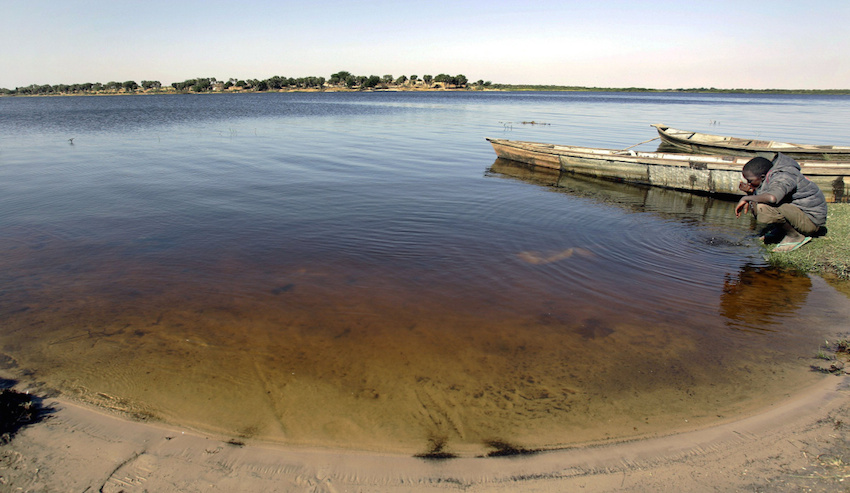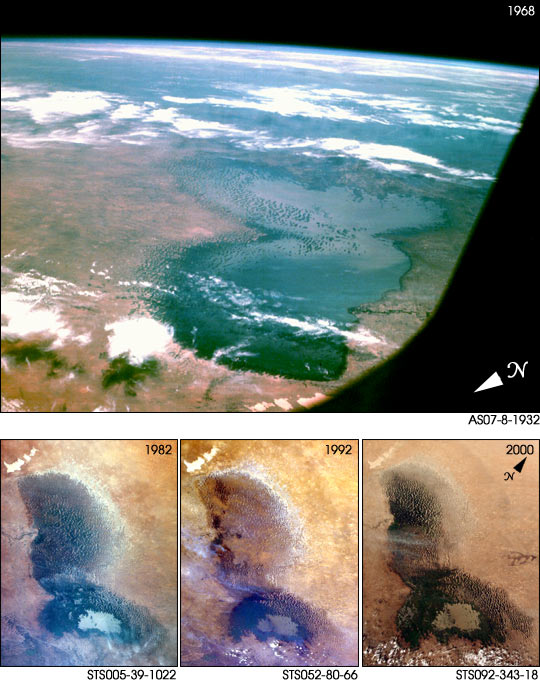By Atâyi Babs

Following significant military success in the fight against insurgents in Nigeria’s North-east and border towns in Chad and Niger, Nigeria has restated its commitment to launch another round of oil prospecting along the troubled Lake Chad.
Dr. Joseph Dawha, Head of the state-owned oil corporation, NNPC disclosed this in an official statement on Monday. Linking the renewed interest to improvements in the security situation in the North-East, Dawha revealed that “Preliminary indications from the previous exercise so far are encouraging and we are going to move back there.”
He described the security situation in the North-East that led to the suspension of oil exploration activities in the Chad Basin as “unfortunate,” while commending the security forces for their recent success in the fight against Boko Haram insurgents.
War on terror
Since February, Nigerian forces backed by neighbors Chad, Niger and Cameroon have won back vast swathes of territory from Boko Haram, which previously controlled an area the size of Belgium.
The militants, who have killed thousands of people in their six-year insurgency, are thought to be largely hemmed in within north Nigeria’s vast Sambisa Forest where the Nigeria military says it is advancing.
With the help of regional armies, Nigerian troops have cornered Boko Haram fighters into Sambisa Forest, where it has rescued nearly 700 women and children that the group had held captive.
Niger has recently evacuated thousands of Nigerian refugees sheltering from Boko Haram fighters on Lake Chad’s Karamga island as the armies of four west African nations battle to quash the Islamist militants

Presidential declaration
While receiving leaders of Nigeria’s North-east region who paid him a congratulatory visit last month, President-elect, Gen Muhammadu Buhari affirmed that the incoming administration will accord priority to ending the Boko Haram insurgency and bring stability in the north east geopolitical zone, focus on re-activating the Lake Chad and deploying enormous resources to resume vigorous search for oil along the Chad Basin in parts of Borno State.
The president-elect his administration will enhance collaboration with neighboring Governments of Chad, Niger and Cameroon to curtail the trans- border movement of Boko Haram insurgents, cut supply of arms, cut recruitment and training of fresh recruits and that stability of the northeast was a must project for his administration noting that nothing can be achieved unless peace was restored to the troubled region.
Gen Buhari also assured the delegation that the receding lake chad will be addressed through the transfer of water from the central African Republic to the lake to boost its commercial activities for fishing and irrigation farming.
While acknowledging delays in oil exploration activities in the Chad Basin, the incoming President said he was very much aware of exploration activities in the area since 1978 as Minister of Petroleum. He said he had visited a site in Borno State as a Head of State to assess exploration activities and that he was very much conversant with the issue and would take it up as President when he settles in office.
General Buhari said he had many years ago, suggested the need to take the search for oil in the north seriously, not only to increase the export potentials on Nigeria, but also to balance cross regional perceptions and manage agitations so as to enhance the stability of the country. He promised to pay special attention to the economic potentials of the northeast so as to make it attractive for investments.
Opposition mounts
In a swift reaction to the president-elect’s declaration, Catholic groups in Nigeria under the aegis of Caritas Nigeria and JDPC kicked against the plan as according to them, “the decision to commence oil prospecting however should not be approached with haste, and certainly not from a sentimental reason of a balancing act between the North and South.”
“From a more rational scientific perspective, fossil fuel is one of the greatest causes of environmental degradation and global warming hence it should not be that while other nations of the world are researching into ways of alternative and efficient energy, we in Africa are still hooked to ideas that promote carbon emissions,”the groups added.
Spokesperson for the groups, Rev. Evaristus Bassey reasoned that “oil prospecting is a multi-million dollar business. With scarce economic resources, occasioned by the drop in oil price, it would amount to people-sabotage, to take resources that could have improved the well-being of hundreds of thousands of citizens into an enterprise that is costly to nature and fast becoming moribund, even if it is a joint venture initiative”.
Receding Lake Chad
Nigeria, Chad, Cameroon, and Niger formed the Lake Chad Basin Commission (LCBC or CBLT in French) in 1964 to

cooperate on the utilization and sustenance of the basin’s natural resources.
Despite the organization’s over 50 years of existence, it has struggled to achieve its set out goals, neither in sustaining the Lake that binds it, nor in strengthening the economic bond between its members.
The Lake Chad, which held so much promise, for power and prosperity, is now almost dried up, thanks to unfavourable climatic conditions and poor regional cooperation.
According to the Global Resource Information Database of the United Nations Environment Programme, the Lake
Chad shrank as much as 95 percent from about 1963 to 1998.
During the 48th Lake Chad Day celebration three years ago, Nigeria’s Minister of Water Resources, Sarah Ochekpe, stated that the lake had receded from 25,000 km2 in the 60s to less than 2,000km2. For a lake on which more than 50 million people from its four surrounding countries depend for their basic needs, its shrinking is more than an economic loss; it is a humanitarian crises.









